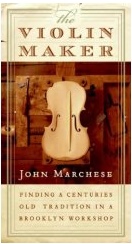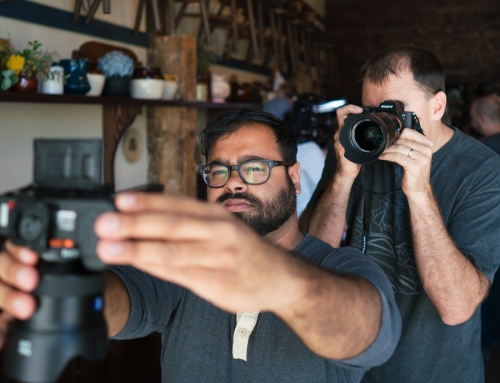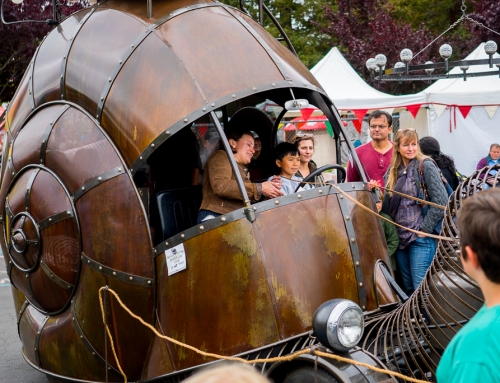I grant you that I know very little about music. The most I can say is that my parents named me after Guy Lombardo (I consider myself lucky because they could have named me after Guy’s brother, and I would be “Carmen Kawasaki.”) That said, I declare this “Violin Monday” for two reasons:
First, I read a great book called The Violin Maker by John Marchese. This is the story of how Sam Zygmuntowicz made a violin for Eugene Drucker of the Emerson String Quartet. The book is a rich description of the work of a craftsman peppered with information about the history of violin making and the musicians who played them.
If you are a John McPhee fan, you will love this book. McPhee is the only person I know who can write a book about oranges or one tennis match
. It’s a stretch to say that reading this book will help you start a Web 2.0 company and sell it to Google, but it will greatly enhance most people’s understanding of craftsmanship. Another book that I would recommend if you want to understand craftsmanship is Uncommon Genius
by Denise Shekerjian.
Second, my friend Pam Chun of Hawaiian Islands Ministry pointed out a story in the Washington Post called “Pearls Before Breakfast” by Gene Weingarten. I nominate this for the most interesting newspaper story of 2007. Basically, the Washington Post convinced a world-class violinist named Joshua Bell to act like a street musician to see how many people would stop to listen to him play and how many would donate money.
He would play his $3.5 million violin made by Antonio Stradivari in 1713. It must be a helluva of violin because it has a name: “Gibson ex Huberman.” The Violin Maker is filled with stories of how violins come to be named, by the way. (Should I give my MacBook Pro, made by Steve Jobs circa 2006, a name?)
Bell played pieces like “Partita in D minor for solo violin,” the Johann Sebastian Bach composition. To summarize: this experiment involved a world-class musician playing Bach on a Stradivari in a Washington D.C. Metro station at 7:51 for forty-five minutes one Friday morning while approximately 1,097 commuters walked past. Before I tell you the results, take this test:
The answer is that he went unrecognized and unrewarded. What does this mean? Maybe that people make assessments about quality based on context and the rest of the herd. (The Violin Maker mentions a story, perhaps apocryphal, about how another world-class musician played a concert with a cheap violin, and the audience had no idea that he did so.) Or, maybe it illustrates what happens to people who are around politicians, lobbyists, and lawyers all the time…
If anyone from the Washington Post reads this, I have two suggestions: First, take a so-so violinist, hand him a Stradivari, introduce him as a wunderkind from the Black Forest, let him play as the opening act at a ritzy concert, and see if the audience fawns over him.
Second, get Steve Jobs to sell iPods for forty-five minutes in a BestBuy in South Dakota and observe what happens.
The lessons that I gleaned from this story are:
Don’t let the absence of trappings and popularity make you believe something is bad.
Don’t let the presence of trappings and popularity make you believe something is good.
Don’t pass by life much less let life pass you by.








Apparently you didn’t actually finish reading the article on Joshua Bell. Someone did recognize him, that was the whole punchline of the article. A woman stayed to listen, then when he took a break, she went up to him to say she’d seen him perform at a recent concert. They have it on video right at the end of the article. They also said he made about $32 in tips.
Or maybe you’re using the words “unrecognized and unrewarded” in some new sense that means “recognized and rewarded.”
******************
Apparently, you didn’t read what I said:
“…while approximately 1,097 commuters walked past.” Then the test says, “Roughly, 1,096 people didn’t figure out who he was. He collected $32 and change.”
1,097 – 1 = 1,096.
Guy
I’m sure it doesnt matter where did the misician plays, Washington, London, Madrid,…people at underground are on a hurry, always, and classic music is not Steve Jobs, the percentage of people having the capacity and knowlege to recognize a great musician is very small. Before making the experiment, they knew what will be the result. Sure.
Guy, your take-aways are spot on. I followed up on the Andy Havens’ “excellent response” (read with appropriate degree of sarcasm) and I believe that while the “smarmy” Washington Post article may have overstated the details or its conclusions, it is worth-while to note that people’s excuse of being too busy or too important to be bothered with appreciating the beauty that surrounds us every day is pathetic. Even when you get caught up in the everyday, one should at least admit that each day is a gift to be treasured.
Another very interesting piece recently made a similar point:
http://www.nytimes.com/2007/04/15/magazine/15wwlnidealab.t.html
hey. the playing violin and busy people wasn’t the point of the story :))
Tangential- but if you enjoyed The Violin Maker, you might also like “The Piano Shop on the Left Bank”- another very good tale of music and the bond between player and instrument.
Books are SO powerful…why aren’t more people writingthem?
Then, I heard from Guy Kawasaki about a book which simply detailed the process of creation of a violin in a shop in Brooklyn, NY.
I really believe that any business anywhere can benefit from doing something outside the box, and writing a book might be…
My middle name is Guy… my parents named me after #10 on the Montreal Canadiens, Guy Lafleur.
**************
Maybe I was wrong, and my parents named me after Guy Lafleur too. Or, they had premonitions of my love of hockey.
Guy
Guy,
Why do I fear that this is another “experiment” that proves whatever the experimenter wants it to prove?
Or, to say it straight out, proves absolutely nothing?
John
Don’t Talk Yourself Out of a Good Opportunity
I play the violin. I play less often than in high school, when I played in a local youth orchestra, or sat in for a few weekend gigs with a bluegrass/folk group. I even briefly considered majoring in music. (I chose finance and business economics inste…
just another bad random sample :-)
I don’t think your suggestions would work. If someone plays poorly at a concert, it would be quickly recognized. (Although that wouldn’t be true at an art gallery.)
And I think Steve Jobs has too much recognition to pull off the BestBuy stunt — although it’s a funny idea and would be great PR.
P.S. Always enjoy your blog.
Thank you for bringing my attention to the Washington Post story :) You write: “What does this mean? Maybe that people make assessments about quality based on context and the rest of the herd.”
I’m absolutely sure this is what it means! I’m both a musician (I play Bach as well, among others) and a geek. All I can say is: quality in art is not recognized by the crowd unless some “authority” approves it’s quality. On the theme of the WP-story: I have stopped several times in streets to listen to exceptional musicians (who were *not put there “for the experiment of it” but out of pure desperation – typical East European musicians), and I just stood there, looking at the people hasting by and thinking “this world just sucks so completely”.
As a former DC commuter, I would have walked by too. Because I do not appreciate music? No. Because people depend on me to be at a certain place at a certain time.
I would like to know what would happen had he played during the afternoon commuter rush. Perhaps people would have been more inclined to stop and listen (as I have done on many occasions when passing by a superb musician or entertainer).
I think what this really proves is that classical music is not commercially viable to the masses. I bet if he played pop tunes he would have raised more tips.
Or maybe classical music is simply not “art” anymore. Art after all is completely subjective and defined by society. What used to be art hundreds of years ago is not anymore and what is art now would be completely alien to other cultures.
Yet, we’ve raised up classical music to this level of “oh wow! It’s classical, so if you don’t appreciate it there must be something wrong with you!” Maybe it’s just not relevant anymore and we’ve moved on to other forms of art?
Painting crude animal figures on cave walls used to be art, but I don’t see any newspaper stories about that. Just one more cause for the Geiko caveman to be upset over.
GJ
http://www.60in3.com
I was astounded about the Joshua Bell story as well. In life, there are instances that transcends the mundane. A novel photograph, an artisans masterpiece, a beautiful woman. Such things can leave me breathless and engaged for hours after the event. Great article!
Gene Weingarten is one of my favorite writers ever.
He also wrote a piece in 2004 about what it’s like “living with terrorism.” It was a commentary on the DHS “Threat Level” color-indicators, etc. He went to Israel and took buses around Jerusalem, etc, that had been recently bombed, to get some real perspective on “threat levels.” It’s an amazing piece.
All of his writing is, really:
http://www.washingtonpost.com/ac2/wp-dyn/A15004-2004Aug19?language=printer
That was a clever job, Guy, editing your article and the poll after I commented. But some of us read your original version.
Stealth edits like this will give you a bad reputation as a blogger. It is not a good idea to try to dupe your readers, or try to discredit commenters by altering your original words.
**************
Charles,
What was the original version that you think I changed because of your comment? I copied and pasted existing text to answer respond to your comment.
I do change my posts constantly–as anyone with RSS feeds can tell you. If you think I’m trying to dupe people or discredit commenters, you’re thinking too much. :-) I simply fix my blog to make it better…
Guy
Interesting post Guy. Remeniscent of your experience here in Kelowna at one of our local Computer Stores perhaps? Do you think the clerk ever Googled you?
********
Never thought of it that way though I’m not exactly Joshua-Bell level! :-)
(1) 1096 rushed by because they have to move and possibly some of them never heard classical before. Big bang have a shock effect, great for attention seeker. Classical is not the tool to generate attention at rush hour.
(2) as for the story of “The Violin Maker mentions a story, perhaps apocryphal, about how another world-class musician played a concert with a cheap violin, and the audience had no idea that he did so.” Isn’t that the story in the movie “magic bow”? The tool (violin) can perform wonder in the hand of a master for sure.
(3) as for mid-class player as a sololist in a classical concert, I am sure it will be noticed and judged harshly, unless they dance beautifully – like some of famous group did. (many of people pay $50-250/head are well educated listener…except the one sit in corp. sponsor box or seat for tax ride off = employee appreciation tickets) . by the way, I had to choose between dinner and concert ticket at university. oh, boy, was I being picky (only for $10.00 rush ticket).
(4) I do like your conclusions. I guess if you can draw a conclusion like that, the story is valid ;-). going to keep it in my mind for all the lessons. thanks.
nice post, nicely put….people don’t always admit how self-absorbed they can be….
Joseph and the amazing hidden Talents – be your own A&R !
This post is about talent in a user generated content world. It’s sort of influenced by the Digitise or Die talk earlier in this week, a piece in the Washington Post I read about on Guy Kawasaki’s blog, and a TV program the kids are fascinated by, the se
Interesting post, there is a corollary too for eg the reality TV shows in the UK to find a Maria for the Sound of Music and a Joseph for the Technicolour Dreamcoat have both unearthed extremely talented amateurs.
I think this has fairly interesting ramifications for Digital Media.
Talent is clearly commoner than we think, but up till now being a gatekeeper of “context” has been very lucrative – what happens in a user generated content / long tail interests era.
Anyway, your post inspired me to write tjoughts on this subject on my blog over here
A world class violinist by any other name might be a street performer
Guy Kawasaki has an interesting post on an experiment by the Washington Post. (original article) It seems that they took a world class violin prodigy playing a $3.5 million dollar violin and plunked him down in a subway station acting like a street …
One Pittsburgh-based violin maker, Philip Injeian, is definitely worth checking out.